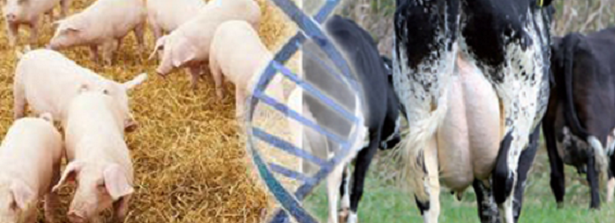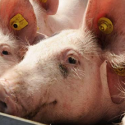Your research can have more impact than you may expect – Why are Brazilian cattle breeders interested in crossbred pigs

Claudia Sevillano is a genetics researcher involved in the NWO Global Challenges Programme (GCP) project called “Locally adapted pork production in Brazil versus the Netherlands”. She has written this Story of change following the GCP training on November 1, 2017, facilitated by Perspectivity.
Global breeding
To give a short background about pig breeding, most commercial swine producers use crossbred pigs rather than purebreds as market animals. For certain traits, crossbred pigs tend to have a better production than the average of their purebred parents. In the last decades in global breeding programs purebred pigs are selected in breeding farms in some countries, i.e. the Netherlands, and their crossbred offspring are sold to commercial farms around the world.
Brazilian and Dutch herd environments are quite different, for instance in terms of climate, feed, and diseases. Therefore, it can be expected that pigs performance will differ between these two countries despite their same genetic background. Efficient local production of pork in Brazil is essential to meet the increasing internal demand for animal protein, and to make the Brazilian pork sector competitive and sustainable towards the future. Therefore, our project aims to study if crossbred pigs produced from these global breeding programs perform equally in Brazilian and in Dutch circumstances. And if using information of crossbred performance from commercial farms in Brazil and the Netherlands could improve the selection of purebred pigs.
My role in the project is to investigate the use of genetic information from crossbred pigs in the evaluation and selection of purebred pigs. When I went to Brazil, as part of the project exchange, I thought there would be limited interest in my research because developments in breeding programs for pigs in Brazil are not very common. Pork production in Brazil is large, however, they mainly import the genetic from breeding farms from abroad.
From pigs to cattle
One day I had the opportunity to present my research at a symposium organized by the Brazilian Agricultural Research Institute (EMBRAPA, by its Portuguese acronym). The symposium gathered many researchers from different Brazilian universities and many breeders associations, mainly cattle breeders. It was to my surprise that my research was of interest to many Brazilian cattle breeder associations. In fact, in many regions of Brazil, due to environmental circumstances, European breeds do not respond well. Therefore, they are crossed with Indicine breeds. Indicine breeds are genetically more resistant to the Brazilian environment, for instance to ticks and high temperatures. As a result, cattle production in Brazil is also based, to some extent, on crossbred animals.
Currently, my approach to use genetic information from crossbred animal is being tested in Girolando cattle. Girolando is a crossbred cattle between Holstein (European breed) and Gyr (Indicine breed) for dairy production. The Universidade Federal de Viçosa, our partner in the research project, and EMBRAPA Dairy Cattle are carrying out the research. he results soon will be published in Journal of Dairy Science.
It is very rewarding that cattle breeders are now also taking advantage of our research insights. Cattle breeders were never identified as stakeholders in our project. However, thanks to disseminating our research, we found interest by this new group. So my advice to any researcher, think out-of-the-box when identifying stakeholders and beneficiaries of your research project, and make sure to widely disseminate your research. Because your research could have more impact than you may expect.
If you want to read more about my research, especially about the new approach to use genetic information from crossbred animal, I encourage you to read these publications:
- Empirical determination of breed-of-origin of alleles in three-breed cross pigs
- Genomic evaluation for a three-way crossbreeding system considering breed-of-origin of alleles
_ _ _
Written by Claudia Sevillano, PhD Candidate at Wageningen University & Research Animal Breeding and Genomics, and researcher at Topigs Norsvin Research Center.






